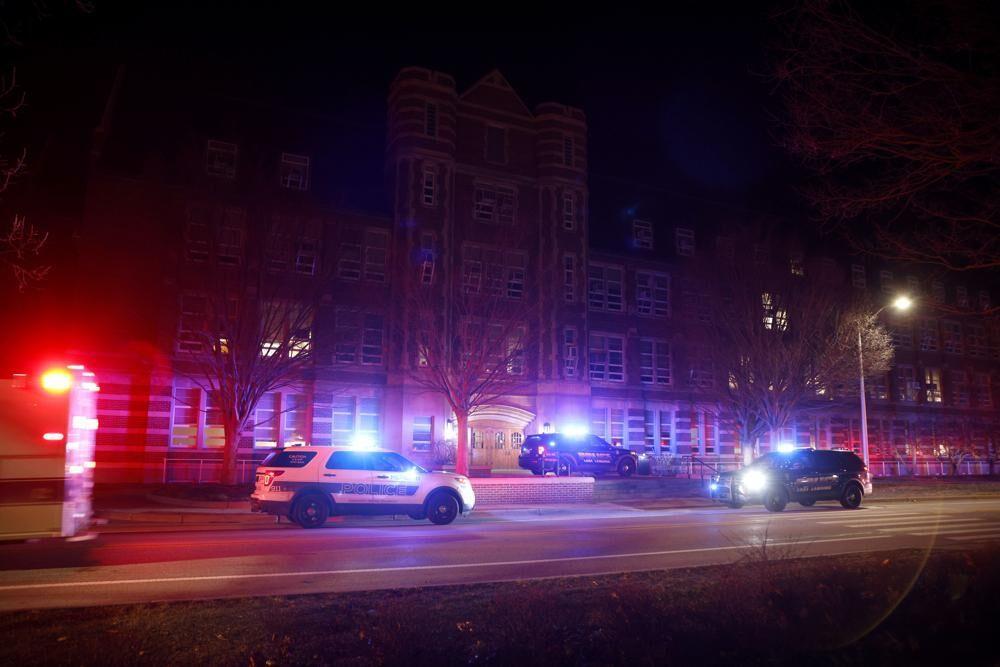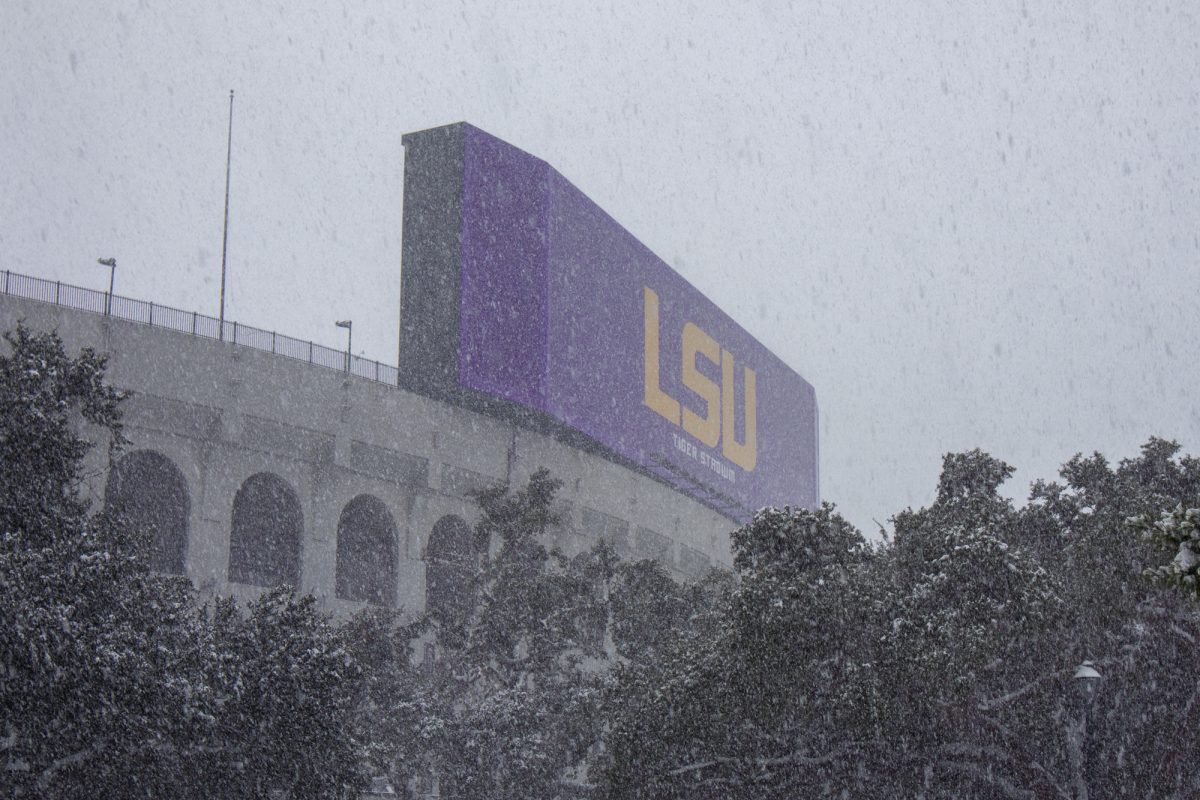EAST LANSING, Mich. (AP) — They broke out windows to escape, barricaded doors and hid under blankets. They silenced their phones — afraid to make even the slightest sound for hours as police searched for a gunman who had already killed three students and critically wounded five others on the Michigan State University campus.
The terror felt by thousands of students — some experiencing their second mass shooting — was evident in texts to parents, posts on social media and in 911 calls.
It started around 8:30 p.m. Monday when Anthony McRae, a 43-year-old with a previous gun violation, opened fire inside an academic building and the student union.
Alerts sent out to students urged them to “run, hide, fight,” and video showed them fleeing as police swarmed toward the chaos. The massive search that ensued ended roughly three hours later when McRae fatally shot himself in a confrontation with police miles from campus, officials said Tuesday.
McRae was neither a student nor an employee of the university. The motive is a mystery.
Jaqueline Matthews, a member of the Michigan State rowing team, remembers crouching inside her school when gunfire erupted at nearby Sandy Hook Elementary. Now a decade later, the 21-year-old international law major was watching chaos outside her campus window, stunned to find herself here yet again.
“The fact that this is the second mass shooting that I have now lived through is incomprehensible,” she said in a TikTok video that she recorded in the early morning hours, demanding legislative action. “We can no longer allow this to happen. We can no longer be complacent.”
She wasn’t the only one experiencing her second mass shooting. Jennifer Mancini told the Detroit Free Press that her daughter also had survived the November 2021 shooting that left four students dead at Oxford High School in southeastern Michigan. Now a freshman at Michigan State, her daughter was traumatized anew.
“I can’t believe this is happening again,” said Mancini, who didn’t want her daughter’s name used.
Others across campus experienced the terror for the first time.
Ted Zimbo, a 26-year-old astrophysics major, said he was heading back to his residence hall after an off-campus meeting when he saw police cars everywhere and a blood-covered woman hiding behind a car. She told him that someone came into her classroom and started shooting.
“Her hands were completely covered in blood. It was on her pants and her shoes,” he told The Associated Press. “She said, ‘It’s my friend’s blood.’”
That, he said, is when it hit him: “There was a real shooting, a mass shooting.”
The woman picked up her phone and started crying, unsure of what happened to her friend. Zimbo spent the next three hours hunkered down in his Toyota SUV, a blanket tossed over him.
In a nearby residence hall, Karah Tanski said she spent two hours “crunched under a desk, crying, thinking I was literally going to die.”
The 22-year-old resident assistant said about 40 freshmen relied on her, social media and police scanners for updates during the lockdown. From empty bomb threats to incorrect details about the shooter, the updates were sometimes wrong and added to the “mass hysteria” of the night, Tanski said.
About a half-mile east of campus, junior Aedan Kelley hid with his roommate, locking his doors and covering windows.
“It’s all very frightening. And then I have all these people texting me wondering if I’m OK, which is overwhelming,” he said.
Ryan Kunkel, 22, said he and his classmates turned off the lights and acted like there “was a shooter right outside the door.” For more than four hours, as they waited, “nothing came out of anyone’s mouth,” he recalled.
“This is supposed to be a place where I’m coming, learning and bettering myself. And instead, students are getting hurt.”
Dominik Molotky said he was in a Cuban history class when he and the other students heard a gunshot right outside the classroom. He told ABC’s “Good Morning America” that a few seconds later the gunman entered the classroom and fired three to four more rounds while the students took cover.
“After that we broke out the window, and I climbed out of there. And then I booked it back to my apartment,” he said.
Claire Papoulias, a sophomore, told NBC’s “Today” show she was listening to a history lecture when she heard gunshots and dropped to the floor.
“At that moment,” she said, “I thought that I was going to die, I was so scared.”
She said she quietly called her mom while classmates opened a window and helped people to jump to safety. Once outside, she grabbed her backpack and phone.
“And I remember,” she said, “I just ran for my life.”
Sophomores Jake Doohan and Nicole Stark were walking off campus when they heard about the shooting and took shelter, barricading a door with a dresser.
With the blinds closed so “not a speck of light could get out,” Stark said she felt like they were watching the news, as though “it’s not actually happening to us.”
The senselessness of it left Doohan stunned.
“It’s sad to think,” he said, “that things like this will happen just out of the blue to anybody or anywhere.”
John and Rona Szydzik, who both graduated from Michigan State University, left flowers on the campus Tuesday after spending the previous night hiding as ambulances wailed past their home.
As a high school teacher, Rona Szydzik has drilled for years to “run, hide, fight.” But she added: “To actually be in it, that’s very shocking.” For her husband, the flowers were a way to let the victims’ families know they cared, that they were praying.
“It really was tough,” he said, becoming emotional as he spoke.
___
Hollingsworth reported from Kansas City, Missouri. Associated Press writers Rick Callahan in Indianapolis; Ed White and Corey Williams in Detroit; Summer Ballentine in Jefferson City, Missouri; Trisha Ahmed in St. Paul, Minnesota; and Freida Frisaro in Fort Lauderdale, Florida, contributed to this report.
AP: Michigan State urges: ‘Run, Hide, Fight’ as gunfire erupts
February 15, 2023
First responders stage outside Berkey Hall following shootings on the campus of Michigan State University, Monday, Feb. 13, 2023, in East Lansing, Mich.






